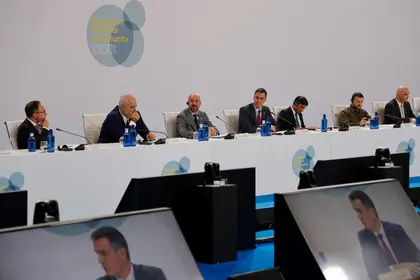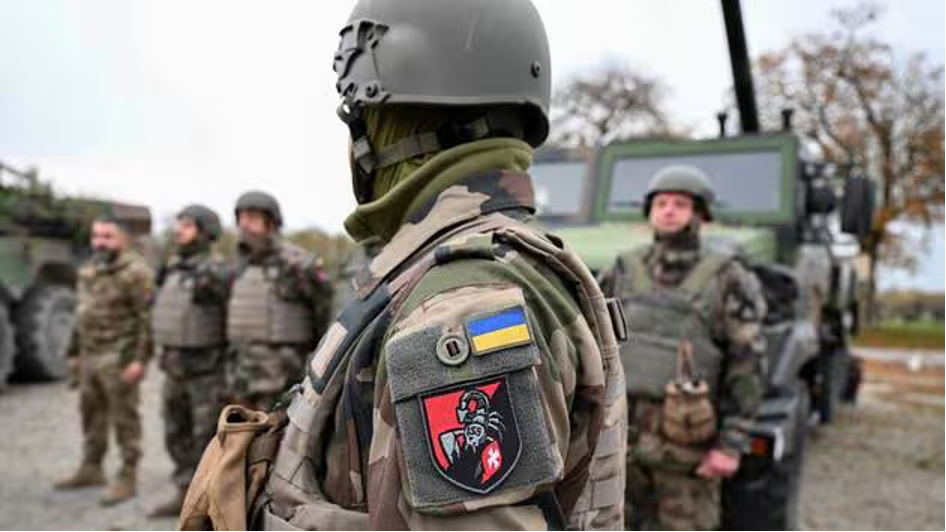The European Union vowed steadfast support for Ukraine at a summit Thursday, Oct. 5, but warned leaders -- including Ukrainian President Volodymyr Zelensky -- it would not be able to fully fill any funding gap left by the United States.
Fears have been ignited by political turmoil in Washington, which on Wednesday prompted President Joe Biden to admit it "does worry me" that US support for Ukraine might get derailed
JOIN US ON TELEGRAM
Follow our coverage of the war on the @Kyivpost_official.
"Can Europe fill the gap left by the US? Well, certainly Europe cannot replace the US," the bloc's foreign policy chief Josep Borrell said on arrival at the meeting of the European Political Community (EPC) in Spain.
Zelensky, speaking to the EPC, expressed concern about "political storms" gripping Washington but said he was confident he still had US bipartisan backing for continued aid.
"America helped us, helped Europe to survive. And now it is important for Europe not to hide sails from the wind to wait out the storm," he said.
The EU and the United States -- together comprising most NATO members -- are vital for Ukraine's fightback.
The European Union and its member countries have promised more than $100 billion in multi-year support to Ukraine, including financing weapon deliveries.
The United States has committed $43 billion in military assistance, while Congress has approved $113 billion in aid including humanitarian help.
But fresh US funding for Ukraine has been put on hold as part of a weekend deal struck with opposition Republicans to avert a US government shutdown.

Putin Says Again He‘s Ready for Compromise - On His Terms, Of Course
Borrell said that result "was certainly not expected -- and it's certainly not good news".
He added that the EU hoped that "is not going to be a definite position of the US".
"Ukraine needs the support of the European Union... but also the support of the US," he said.
- 'Cannot compensate' -
Maintaining European assistance to Ukraine was a dominant issue at the EPC summit in Granada, which gathered leaders from almost all countries across the European continent with the pointed exclusion of Russia.
"I do believe that all the leaders understand the risks of not providing full support to Ukraine," said Moldovan President Maia Sandu, whose country, neighboring Ukraine, is vying to join the EU.
But Luxembourg premier Xavier Bettel, like Borrell underlined that "we cannot compensate" for any US shortfall in aid for Ukraine.
"That would be not possible, but we have to continue to support as much as we can," he said.
While noting Europe has no say in "internal US affairs," Bettel said "we hope that it will find a solution soon in the interest of of Ukraine".
European Commission chef Ursula von der Leyen portrayed the truncation of US financial support to Ukraine as just a question of "timing" for Washington.
She stressed that work was going on to concretize half the promised EU aid to Ukraine -- 50 billion euros ($53 billion) over the next four years -- to give Kyiv "predictability and reliability" for its strained budget.
Leaders at the EPC summit said Russian President Vladimir Putin's calculation was that the West would become fatigued at long-term support of Ukraine, handing him a path to victory.
"I think Russia wants us to be tired," Estonia's Prime Minister Kaja Kallas said, adding: "We should show them that we are not. We have to help Ukraine as long as it takes."
The issue, however, was expected to dominate an EU-US summit taking place in Washington in two weeks' time, between Biden, von der Leyen and European Council head Charles Michel.
Aside from the ongoing war in Ukraine, the leaders at the EPC summit were to tackle the issue of migration, with British Prime Minister Rishi Sunak and Italy's Georgia Meloni pushing for a policy to prevent boats carrying asylum seekers setting off for Europe.
You can also highlight the text and press Ctrl + Enter






